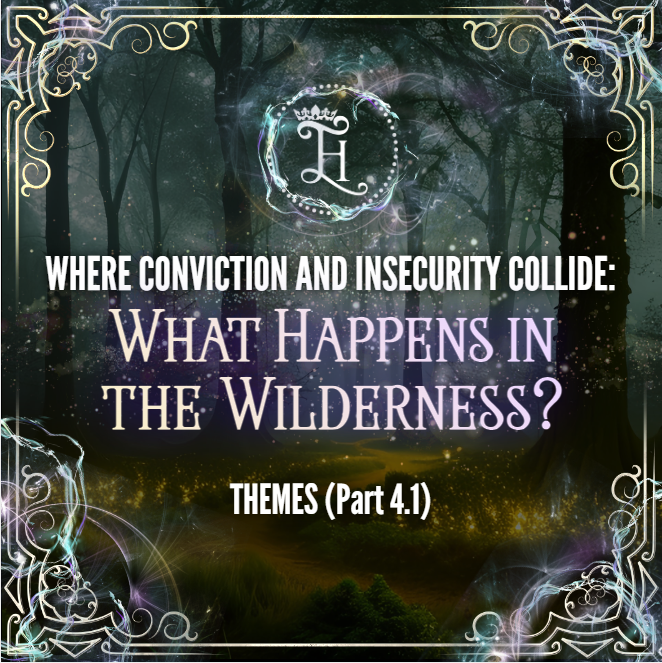
Fatherhood | Themes (Part 4.6)
If I am to ever be called ‘privileged’ it should be for this singular blessing in my life. It was not earned, nor deserved, but a blessing I was given to pass on. A blessing we see inherited by Luscia.
There are demons she faces upon returning to her highland home. In my heart, I could not formulate for Luscia a path to healing without first granting her the foundation of my own. I touched on this in HOBL’s acknowledgements, but he deserves more adequate attention in this forum.

Devotion, Duty, and Deception | Themes (Part 4.5)
Organized falsehood—that of institutions or associations—is neither the most insidious nor prevalent form of deception in modern society. Blatant lies infect people’s thinking less than their own perversions of conscience; those little, incremental compromises made under the guise of a greater good. Deception is all around. Deception vies for our attention at nauseum. Even still, more often than not, deception derives from within.

Faith vs. Zealotry | Themes (Part 4.4)
Delusion doesn’t come like a thief, but a lover. It seduces and caresses hearts and minds toward something akin to truth, possibly even feigning its traits, but devoid of its redemptive power. All the while, delusion stirs up the same sort of passion that ought to have motivated the original, uncorrupted belief.
There is a popular maxim within the Christian tradition: Be in the world but not of it.
More often than not, zealotry arises when the latter rule is severed from the former.

Virtue vs. Vice | Themes (Part 4.3)
We’ve all seen the marshmallow experiment. The one where kids are sat in a room and told that if they wait, they’ll get two treats instead of the one directly before them. As expected, the majority of children cannot wait. They eat the single marshmallow. And it all sounds a bit silly, but those children eventually grow up. They become leaders, lovers, and laymen. Like our beloved libertine, Ira Hastings, they become people who live for the here and now.
But the here and now is just that…it’s focused on right now.
We need more than one marshmallow to build a future. The Quadren requires all their marshmallows to win a war.

Identity | Themes (Part 4.2)
What we love informs who we are, Aquinas wrote, and according to Spencer, that moored identity naturally informs our behavior. This principle colored Luscia’s character arc to an extent, but completely uprooted Zaethan’s. After the events and revelations at the end of Book 2, our haidren to Darakai finds himself beaching foreign shores, knowing just about as much about the House of Boreal as he does his own name. Understandably, this rocks Zaethan at his inmost levels. He doesn’t know who he is or what he’ll become. All he knows is the pain that got him there.
And that is the most promising place he’s landed yet.

“What Happens in the Wilderness?” | Themes (Part 4.1)
This single question was the prevailing anthem of HOBL. As I eluded, I knew this would be an unpopular question as none of us like to ask it. Even fewer to live the answer.
But with Luscia, Zaethan, Dmitri and crew essentially on the run, marked as outlaws and fleeing to sanctuary in Boreal, that’s essentially where they are headed—into the wilderness. It may be a beautiful, haunting, majestic wilderness…but its a vast unknown. A holding pattern of sorts, as the Quadren is tucked and barred behind a seemingly impenetrably border. They are safe. They are stagnant. They are bound by a foreign political system they do not understand nor can sway.
And they are forced to wait.

Where Conviction and Insecurity Collide: Pacing (Part 3)
Stillness is cultivated. It’s an evolutionary thing, growing without hurry.
Luscia discovered this on her klödjen. Yet no one else could if I did not preserve the space between the pages to do so. The book’s themes demanded to be heard.

Where Conviction and Insecurity Collide: Boreali Fidelity (Part 2)
Each territory, people group, and culture deserves the same respect as that which came before. The problem—or challenge at least—is that readers will fall in love with some Houses more than others, and will wish to imprint those traits onto the subsequent books.
But it doesn’t work like that. It can’t, not if we want to preserve distinctions.
Without distinctions, we have no Orynthia.

The Place Where Conviction and Insecurity Collide (Part 1)
I’ve mentioned in recent posts, and addressed during the release day live Q&A, how the third installment was the hardest to write. Most interpret that statement as a reference to a wicked case of writer’s block. How I wish it’d been that easy. No, this book was plagued by something far stronger than that.
Frankly, my conviction was at war with my worst insecurities while writing this book.
Though, to finish it, conviction needed to win.

Real Trauma and Healing in the Minds of the Make-Believe
To survive, we all stitch on a mask and eventually call it skin.
And that is why trauma is so violent. Removing our mask is a terrifying, bloody mess.
The good news, is that sorrow and joy do go hand in hand. As does mercy and justice. Because it’s in those ravines where the best stories—stories like our own—unfold. Luscia and Zaethan’s interdependent sagas are not one in a million, they’re ones just like a million others.

What’s in a name? The untold story behind the naming of my opposing MCs.
For millennia, across continents and cultures and creeds, names have held their weight in gold. They’ve been prophetic, poetic, emboldening, and strange. Because names have power.
Request a Topic
Have a specific interest on writing craft, or elements of the Orynthian world you’d like me to blog about? Simply complete this form to let me and #TeamHaidren know what we ought to add to the docket!

